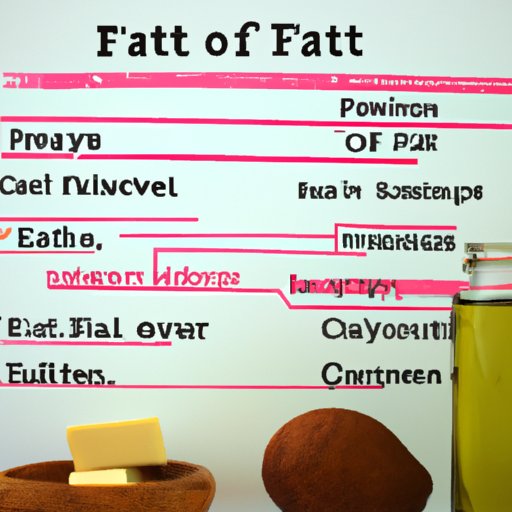Introduction
When it comes to nutrition, fats are often seen as something that should be avoided or limited. However, not all fats are created equal, and some may even have health benefits. In this article, we will explore the role of dietary fats in health and disease, and examine the pros and cons of eating fats.
Definition of Dietary Fats
Dietary fats are compounds made up of carbon, hydrogen, and oxygen atoms. They are an essential part of our diets, providing energy and helping with the absorption of certain vitamins and minerals. Dietary fats are divided into four main categories: saturated, monounsaturated, polyunsaturated, and trans fats.
Overview of the Benefits and Risks of Eating Fats
The type of fat you consume can have an impact on your health. While some types of fats, such as omega-3 fatty acids, can provide health benefits, others, such as trans fats, can increase the risk of certain diseases. Therefore, it is important to understand the different types of fats and how they can affect your health.

Examining the Benefits of Eating Healthy Fats
While all fats are calorically dense, some are considered to be healthier than others. Let’s take a look at some of the most beneficial types of fats and their roles in health and disease prevention.
Omega-3s: Their Role in Health and Disease Prevention
Omega-3 fatty acids are polyunsaturated fats found in fish, nuts, seeds, and plant oils. They are important for brain development, heart health, and reducing inflammation. Studies have shown that consuming omega-3s can reduce the risk of stroke, heart disease, and some cancers.
Monounsaturated Fats: Their Role in Heart Health
Monounsaturated fats are found in olive oil, avocados, and nuts. They are thought to improve cholesterol levels and reduce the risk of heart disease. Studies have shown that consuming monounsaturated fats can lower bad (LDL) cholesterol levels and raise good (HDL) cholesterol levels.
Other Types of Healthy Fats and Their Benefits
In addition to omega-3s and monounsaturated fats, there are other types of healthy fats that can provide health benefits. These include polyunsaturated fats, which are found in fish, walnuts, and flaxseed, and can help reduce inflammation. There are also short chain fatty acids, which are found in dairy products and can help promote gut health.

Exploring the Role of Dietary Fats in Health and Disease
Now that we’ve looked at the benefits of eating healthy fats, let’s take a closer look at how dietary fats can affect health and disease.
The Role of Fats in Cardiovascular Disease
Cardiovascular disease is a major cause of death worldwide, and diet plays a role in its prevention and management. Studies have shown that consuming too much saturated fat and trans fat can increase the risk of heart disease. However, replacing these unhealthy fats with healthy fats, such as omega-3s and monounsaturated fats, can help reduce the risk.
The Role of Fats in Diabetes
Diabetes is a chronic condition that affects millions of people around the world. Studies have shown that consuming too much saturated fat and trans fat can increase the risk of developing diabetes. Eating a diet rich in healthy fats, such as omega-3s and monounsaturated fats, may help reduce the risk of developing diabetes.
The Role of Fats in Cancer
Studies have shown that consuming too much saturated fat and trans fat can increase the risk of certain types of cancer, such as colorectal cancer. Replacing these unhealthy fats with healthy fats, such as omega-3s and monounsaturated fats, may help reduce the risk of cancer.

Investigating Different Types of Dietary Fats and Their Effects on the Body
Now that we’ve explored the role of dietary fats in health and disease, let’s take a closer look at the different types of fats and their effects on the body.
Saturated Fats
Saturated fats are found in animal products, such as red meat, poultry, and dairy. They are usually solid at room temperature and can raise bad (LDL) cholesterol levels, increasing the risk of heart disease. Too much saturated fat can also lead to weight gain and other health problems.
Trans Fats
Trans fats are found in processed foods, such as crackers, chips, and baked goods. They are usually solid at room temperature and can raise bad (LDL) cholesterol levels, increasing the risk of heart disease. Eating too much trans fat can also lead to weight gain and other health problems.
Unsaturated Fats
Unsaturated fats are found in plant sources, such as nuts, seeds, and vegetable oils. These fats are liquid at room temperature and can help lower bad (LDL) cholesterol levels and raise good (HDL) cholesterol levels. Eating unsaturated fats can also help reduce inflammation and protect against certain diseases.
What You Need to Know About Fat Intake for Optimal Health
Now that you know more about the different types of fats and their effects on the body, you may be wondering how much fat you need to eat for optimal health. Here are some tips to help you make sure you’re getting enough of the right kinds of fats.
Recommended Amounts of Fat Intake
The recommended daily intake of fat for adults is 20-35% of total calories. This means that if you eat 2000 calories per day, you should aim for 44-78 grams of fat per day. It’s important to note that not all fats have the same effects on the body, so it’s important to choose healthy fats over unhealthy ones.
Sources of Healthy Fats
Healthy sources of fat include fish, nuts, seeds, avocado, olive oil, and other plant-based oils. These fats are high in omega-3s, monounsaturated fats, and polyunsaturated fats, and can help reduce the risk of heart disease and other health conditions.
Tips for Reducing Unhealthy Fats
If you want to reduce your intake of unhealthy fats, such as saturated and trans fats, try to limit your consumption of processed foods and animal products. Instead, opt for plant-based sources of fat, such as nuts, seeds, and vegetable oils.
How Fat Consumption Affects Metabolism and Weight Loss
In addition to its role in health and disease, fat can also affect metabolism and weight loss. Let’s take a closer look at how fat consumption can affect these two areas.
The Role of Fats in Metabolism
Fats are an important source of energy for the body, and they can also play a role in metabolism. Eating a diet high in healthy fats can help boost metabolism and keep you feeling fuller for longer. Additionally, healthy fats can help regulate hormones and keep your blood sugar levels stable.
The Role of Fats in Weight Loss
Fats can also play a role in weight loss. Eating a diet high in healthy fats can help reduce cravings and keep you feeling fuller for longer, which can be beneficial for weight loss. Additionally, healthy fats can help regulate hormones and keep your blood sugar levels stable, which can help with weight loss.
A Look at the Pros and Cons of Eating Fats
Now that we’ve explored the role of fats in metabolism and weight loss, let’s take a look at the pros and cons of eating fats.
Pros of Eating Fats
Eating fats can provide a number of health benefits, including improved heart health, reduced inflammation, and better blood sugar control. Additionally, healthy fats can help you feel fuller for longer and boost metabolism, which can be beneficial for weight loss.
Cons of Eating Fats
Although there are many benefits to eating fats, there are also some drawbacks. Eating too much saturated fat and trans fat can increase the risk of heart disease, diabetes, and certain types of cancer. Additionally, too much fat can lead to weight gain and other health problems.

Understanding the Role of Fats in a Balanced Diet
Now that we’ve looked at the pros and cons of eating fats, let’s discuss how to create a balanced diet with healthy fats.
Creating a Balanced Diet with Healthy Fats
Eating a balanced diet with healthy fats is key to optimal health. Aim to get 20-35% of your daily calories from healthy fats, such as omega-3s and monounsaturated fats. Additionally, limit your intake of unhealthy fats, such as saturated and trans fats.
Foods to Avoid When Trying to Eat Healthily
When trying to eat healthily, it’s important to limit your intake of processed foods, such as chips, crackers, and baked goods. These foods are often high in unhealthy fats, such as saturated and trans fats, which can increase the risk of heart disease, diabetes, and certain types of cancer.
Conclusion
In conclusion, dietary fats are an essential part of a balanced diet and can provide a number of health benefits. Eating healthy fats, such as omega-3s and monounsaturated fats, can help reduce the risk of heart disease, diabetes, and certain types of cancer. However, it’s important to limit your intake of unhealthy fats, such as saturated and trans fats, as these can increase the risk of certain diseases. By creating a balanced diet with healthy fats, you can ensure you are getting the nutrients you need for optimal health.
(Note: Is this article not meeting your expectations? Do you have knowledge or insights to share? Unlock new opportunities and expand your reach by joining our authors team. Click Registration to join us and share your expertise with our readers.)
